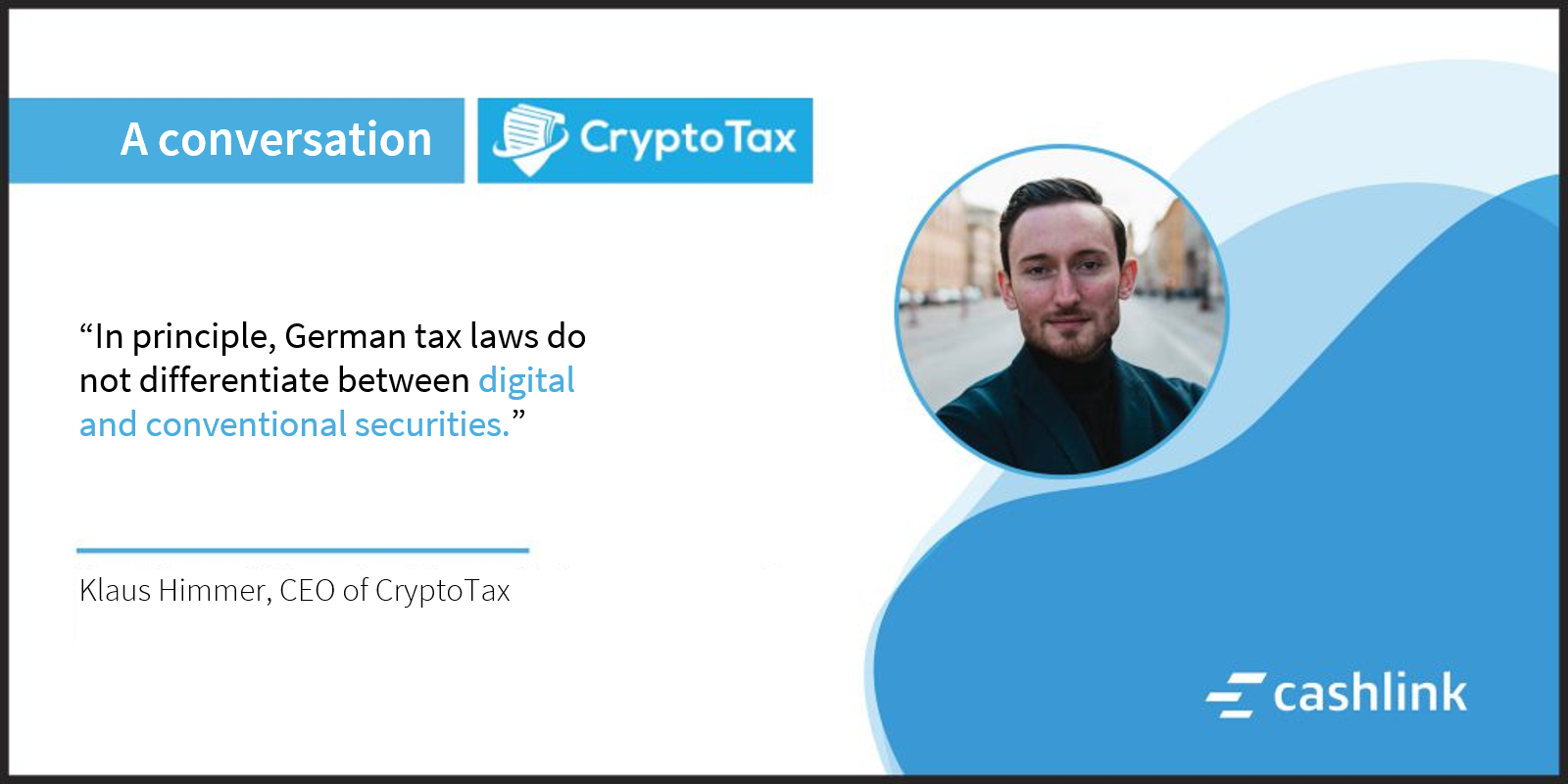

EXPERT INTERVIEW
The taxation of digital securities: A conversation with CryptoTax




We are often asked whether investors need to consider special aspects when taxing digital securities. We have discussed these questions for you with our partner CryptoTax, represented by the CEO Klaus Himmer.
Cashlink: Dear Klaus, we are happy that you are our guest today. Tell our readers something about you and your company CryptoTax!
Klaus Himmer: Dear Cashlink-Team, thank you very much for the invitation! I am the managing director and co-founder of CryptoTax a LegalTech start-up from Munich that specializes in the taxation of digital assets. With our web application, we help private investors in Germany, Switzerland and the USA to declare their income from trading in crypto currencies and other asset classes to the tax authorities. We also offer a white-label tax reporting API for companies providing financial services and a capital gains tax solution for issuers of tokenized securities – e.g. via the Cashlink infrastructure. Further information can be found here.
Cashlink: Must digital securities be taxed differently from securitized securities?
Klaus Himmer: Basically no. In both cases, current income such as dividends or interest payments as well as capital gains are regularly subject to taxation at the final withholding tax rate of 25%. The solidarity surcharge and, if applicable, church tax are also levied. However, differences may arise in the taxation procedure. The tax on income from “conventional” securitized securities is generally withheld directly by the domestic disbursing agent or the agent executing the sales order in the so-called capital gains tax deduction procedure. This is done regardless of whether the income is current income or capital gains. The same should apply insofar as digital securities are held in safe custody by a regulated domestic company and trading takes place on a regulated domestic trading venue. However, if digital securities are held in safe custody by the investor itself and/or unregulated trading or trading takes place with a foreign offeror, special considerations must be taken into account.
Cashlink: What special features must an investor in digital securities take into account with regard to the taxation of the assets?
Klaus Himmer: Depending on the structure and custody of the security, it should be checked whether withholding tax has already been withheld on distributions or interest payments and any capital gains. If this is not the case, such income must be disclosed in the income tax return – otherwise it can be considered tax evasion! If, on the other hand, tax has already been withheld, a tax certificate can be obtained from the party obliged to withhold tax (e.g. the issuer or broker*in), with which, for example, an optional loss offset or tax credit can be carried out.
Cashlink: Are there any special challenges in the taxation of digital securities that have not played a role in securitized securities so far?
Klaus Himmer: Yes and no. In principle, German tax laws do not distinguish between “digital” and “conventional” securities. Therefore, the same regulations apply. However, in practice, constellations can arise with digitized assets that are rather unusual in the conventional financial market and therefore lead to “unfamiliar” tax consequences. This includes, above all, the self-custody of securities by the investing person. Since this constellation renders a custodian bank superfluous, a person or a company issuing securities in Germany may have to calculate capital gains tax, surcharge tax and church tax and pay them for the investors. In addition, there are further obligations and detailed questions that have to be observed in the context of the capital gains tax deduction procedure.
From the perspective of the investors, there are also special features of self-custody. If the issuing person or company is located abroad or if a trade takes place outside a regulated domestic trading place, the investors must calculate their investment income themselves and disclose it in their tax return, which in practice often quickly becomes complex. This is where CryptoTax comes into play. We help issuers to integrate a capital gains tax solution and investors to declare their income.
Starten Sie Ihr eigenes Tokenisierungsprojekt
- Unverbindliche & kostenlose Erstberatung durch Experten
- Individuell an Ihre Bedürfnisse angepasste Lösung
- Digitalisierungsprojekte einfach, flexibel & transparent umsetzen


Haben Sie weitere Fragen zu unseren Produktpaketen?
Ich bin Michael, Co-Founder und CEO von Cashlink Technologies! Sollten Sie Fragen zu den einzelnen Produktpaketen haben, zögern Sie nicht und vereinbaren Sie gerne einen unverbindlichen Beratungstermin mit unserem Expertenteam – dieser sollte alle offenen Fragen klären!